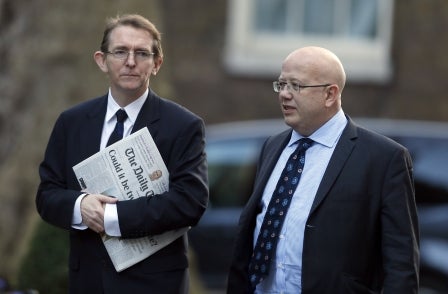
National newspaper editors said last night that they will put in place the broad proposals of the Leveson Inquiry – apart from the call for statutory underpinning.
A statement issued on behalf of the editors said: "The editors of all national newspapers met yesterday and unanimously agreed to start putting in place the broad proposals – save the statutory underpinning – for the independent self-regulatory system laid out by Lord Justice Leveson.
"Lord Hunt and Lord Black will report back to the Government very shortly in detail on how the industry proposes to implement the Leveson plan."
The editors met yesterday to discuss joint efforts to produce proposals sufficiently strong to see off demands for a watchdog backed by law.
Culture Secretary Maria Miller set a two-day deadline for a timetable of action when she met senior Fleet Street figures in Downing Street on Monday.
Lord Justice Leveson's inquiry into press ethics, prompted by the phone-hacking scandal, recommended a statutory body to oversee a beefed-up watchdog.
Prime Minister David Cameron is reluctant to take that step, warning it could pose a future threat to free speech, but has told the industry it must act fast to convince politicians and the public that it is not necessary.
Labour, the Liberal Democrats and a large number of Conservative MPs are united with victims of press abuses and other campaigners in demanding full implementation.
And today campaign group Hacked Off said the Prime Minister should resist any temptation to remove the "heart and soul" of the Leveson report's recommendations.
The group attacked the ideas put forward after Cameron met the national newspaper editors and industry figures on Monday, warning that watering down Lord Justice Leveson's recommendations would make a "charade" of the process.
In a press conference at the Houses of Parliament they accused politicians and newspaper editors of doing deals "behind closed doors" and called for a validatory body to be created to oversee an independent regulator.
Spokeswoman Natalie Fenton said: "Until we actually have that, and that can be a process whereby independence and effectiveness of this body can be regulated, everything else is pointless.
"We need to be very, very clear that Lord Justice Leveson said this was essential in order for his proposals to be acceptable at any level.
"Until that happens, the concerns of the victims, the concerns of the public, will not be dealt with and will not go away.
"It is a charade for the politicians and the editors to get together and pick out some of the recommendations and say these are acceptable or not and take out the heart and soul of the Leveson recommendations which provide the backbone for establishing a fair system going forward."
Independent editor Chris Blackhurst said editors were "pretty much agreed" on all the non-statutory elements of the system proposed by the Leveson report.
That includes the power for a new regulator to levy fines of up to £1 million, to launch investigations and to dictate the size and prominence of apologies.
Mr Blackhurst suggested there was also consensus on making the new body independent of the press – though with the caveat that journalists help draft a new code of practice.
But he said there remained "one or two grey areas", notably over the practical operation of a proposed arbitration system and a non-statutory "verifier" proposed by ministers.
Proposals floated by Cabinet Office Minister Oliver Letwin at Monday's Downing Street summit for a non-statutory "verifier" remained "incredibly vague".
Email pged@pressgazette.co.uk to point out mistakes, provide story tips or send in a letter for publication on our "Letters Page" blog
